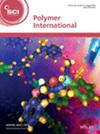Serap Başkır, Alican Onur Cankaya, Emre Tekay, Berkay Erenay, Bora Garipcan, Özgür Kocatürk
求助PDF
{"title":"Shape memory polyurethane synthesis using glycerol as chain extender for biomedical applications","authors":"Serap Başkır, Alican Onur Cankaya, Emre Tekay, Berkay Erenay, Bora Garipcan, Özgür Kocatürk","doi":"10.1002/pi.6725","DOIUrl":null,"url":null,"abstract":"<p>Incorporation of shape memory polymers into biomedical devices is an attractive option due to their notable advantages of low cost, biocompatibility, tunable degradability, patient-specific design and adjustable mechanical and thermal properties. Shape memory polyurethanes are particularly attractive due to their extensive temperature range for shape recovery as well as the ability to fine-tune the glass transition temperature. This study aimed to synthesize a shape memory polyurethane using glycerol as chain extender with a glass transition temperature within a suitable temperature range for biomedical applications. The results showed that the triggering temperatures for the synthesized samples change between 63.95 °C and 88.21 °C. Shape memory properties were investigated for the temperature range 40–75 °C. Shape recovery times were found to be substantial with increasing temperature with ~102 s at 40 °C and ~1 s at 75 °C. Shape fixity and shape recovery rates for the same temperature ranges were 77.8% and 85.6% at 40 °C and 100% and 100% for 75 °C. The cytotoxicity assay indicates promising biocompatibility of the synthesized material for biomedical purposes. Overall, the synthesized polymers were found to be a potential candidate for biomedical applications such as stents, aneurysm filling or occlusion devices. © 2024 Society of Chemical Industry.</p>","PeriodicalId":20404,"journal":{"name":"Polymer International","volume":"74 4","pages":"336-345"},"PeriodicalIF":3.6000,"publicationDate":"2024-11-29","publicationTypes":"Journal Article","fieldsOfStudy":null,"isOpenAccess":false,"openAccessPdf":"","citationCount":"0","resultStr":null,"platform":"Semanticscholar","paperid":null,"PeriodicalName":"Polymer International","FirstCategoryId":"92","ListUrlMain":"https://scijournals.onlinelibrary.wiley.com/doi/10.1002/pi.6725","RegionNum":4,"RegionCategory":"化学","ArticlePicture":[],"TitleCN":null,"AbstractTextCN":null,"PMCID":null,"EPubDate":"","PubModel":"","JCR":"Q2","JCRName":"POLYMER SCIENCE","Score":null,"Total":0}
引用次数: 0
引用
批量引用
Abstract
Incorporation of shape memory polymers into biomedical devices is an attractive option due to their notable advantages of low cost, biocompatibility, tunable degradability, patient-specific design and adjustable mechanical and thermal properties. Shape memory polyurethanes are particularly attractive due to their extensive temperature range for shape recovery as well as the ability to fine-tune the glass transition temperature. This study aimed to synthesize a shape memory polyurethane using glycerol as chain extender with a glass transition temperature within a suitable temperature range for biomedical applications. The results showed that the triggering temperatures for the synthesized samples change between 63.95 °C and 88.21 °C. Shape memory properties were investigated for the temperature range 40–75 °C. Shape recovery times were found to be substantial with increasing temperature with ~102 s at 40 °C and ~1 s at 75 °C. Shape fixity and shape recovery rates for the same temperature ranges were 77.8% and 85.6% at 40 °C and 100% and 100% for 75 °C. The cytotoxicity assay indicates promising biocompatibility of the synthesized material for biomedical purposes. Overall, the synthesized polymers were found to be a potential candidate for biomedical applications such as stents, aneurysm filling or occlusion devices. © 2024 Society of Chemical Industry.
以甘油为扩链剂合成生物医学用形状记忆聚氨酯
由于形状记忆聚合物具有低成本、生物相容性、可调节降解性、患者特异性设计以及可调节的机械和热性能等显著优势,因此将其纳入生物医学设备是一个有吸引力的选择。形状记忆聚氨酯特别有吸引力,因为它们具有广泛的形状恢复温度范围以及微调玻璃化转变温度的能力。本研究旨在以甘油为扩链剂合成一种形状记忆聚氨酯,其玻璃化转变温度在适合生物医学应用的温度范围内。结果表明,合成样品的触发温度在63.95 ~ 88.21℃之间变化。在40-75°C的温度范围内研究了形状记忆性能。随着温度的升高,形状恢复时间显著延长,在40℃时为~102 s,在75℃时为~1 s。在相同温度范围内,形状固形性和形状回收率在40℃时分别为77.8%和85.6%,在75℃时分别为100%和100%。细胞毒性试验表明合成材料具有良好的生物相容性。总的来说,合成的聚合物被认为是生物医学应用的潜在候选者,如支架,动脉瘤填充或闭塞装置。©2024化学工业学会。
本文章由计算机程序翻译,如有差异,请以英文原文为准。




 求助内容:
求助内容: 应助结果提醒方式:
应助结果提醒方式:


